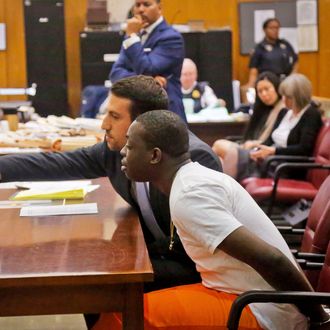
On September 15, incarcerated rapper Bobby Shmurda appeared for an interview with the New York State Board of Parole, asking for early release. The rapper, legal name Ackquille Pollard, was denied release shortly thereafter and “given a hold until the maximum expiration of his sentence on December 11, 2021,” prison officials said. Pollard has been locked up for around six years — about two in New York City jail and four in state prison — following his December 2014 arrest.
Prosecutors had said that Pollard was in an East Flatbush gang, GS9, which participated in a “protracted turf battle with multiple other rivals,” including Brooklyn’s Most Wanted, between January 2013 and October 2014. Twenty-one people were charged in this indictment. Pollard pleaded guilty on September 9, 2016, to conspiracy in the fourth degree and criminal possession of a weapon in the second degree. Vulture obtained a transcript of this parole-board interview, and it provides the first concrete details into what happened during the hearing. Here, what we learned.
Bobby Shmurda thinks he’s too old for crime
During his interview, Pollard told the board, “I feel like I’m getting too old” for trouble when he gets out of jail.
“Before, when I was younger, I felt like if I walked away from a fight or a punk, or I’m looked at as a punk, or next person going to try to fight me, and now it’s just, like I’m too grown to be fighting and be yelling and arguing. Just like, I walk away and I don’t care about what nobody says about me no more,” Pollard also said.
“I was just young, I was just being a follower, everybody else, and then I got older, I started making music and then I seen my life take off in a different path, but my past just caught up with me,” he claimed at another point.
He provided details on his involvement in crime
Pollard was asked about the weapon-possession charge he had pleaded guilty to in 2016, with the board noting he was accused of having “a loaded pistol.” The board asked if he had ever used it; Pollard said no. It asked why he had this weapon. Pollard said he had a weapon illegally “for protection, because I was wearing jewelry and doing a bunch of shows and stuff, and I didn’t want to get robbed. Instead of getting security, just being young and stupid.”
“When you get out, are you going to get security?” the board asked, to which he replied, “Yes, ma’am.”
“Was there ever talk about murdering people?” the board also asked.
“Not around me.”
“Not around you. There weren’t code words that you used that meant murder or something?”
“On the indictment a couple people got convicted for murder, but I wasn’t that circle, like I wasn’t a part of that,” he said.
He had a weapon to “defend” himself at Rikers
Pollard was asked about an allegation that he had contraband in prison — specifically, in the board’s words, a “sharpened metal object in a glove balloon.” He said that Rikers is “just a crazy place,” and “I feel like I start trying to learn how to defend myself and try to learn how not to get in trouble, but I came to Rikers, it was so crazy weird.” “I had it to defend myself,” he said.
Pollard said he didn’t ask anyone to give him the contraband, claiming “somebody just gave it to me, but I came in — like, they gave me the rules of the place, like you’re going to need this just in case of this and that.”
He wants to finish his education and keep performing
Pollard, who got job training in “floor covering” while imprisoned, said he wants to get his high-school equivalency. When Pollard gets out, he said, “I’m still going to entertain” and help at-risk youth.
“I just got a lot of plans to just talk to like — I grew up in a lot of juvenile sentence, so I just want to talk to the juvenile kids, let them know that even when you come up in certain places, I feel that I was — I was raised, sometimes you feel deprived. You feel like you can’t be nothing and jail is it, that’s it,” he told the board. “I want to talk to those kids, you know, in those places and tell them they can be more and this is not it. Nobody want to spend their life in jail and I feel like they can do so much more.”
The board didn’t buy it
In issuing its decision, the parole board stated, “Based on your record and our interview this panel is not convinced that you are ready to live and remain at liberty without violating the law. At this time your release would not be compatible with the welfare of society.”


